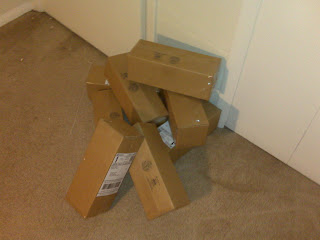On Friday I attended my first monster movie double feature... well... I tried to. We decided that instead of watching the second movie that we would go for dinner instead. When two classic films only costs $4 bucks, I didn't feel terrible about leaving for more social environments. At least the first of the monster movies was one of my favorites,
Frankenstein. (Sorry
Wolfman... better luck next year).

The theatre was opulent. It was my first ever visit to this particular land of gold leaf and red velvet. It was, in all honesty, the perfect environment to watch a 1930s movie. They even played an organ during the opening credits!

At any rate, once I got over the initial excitement of the venue and the overwhelming sense of historical connection watching a movie in such a grand space as it would have originally been shown, I felt my own sense of nostalgia. You see,
Frankenstein is one of my favorite books.
Now this often sounds strange to people, I have even been mocked. Yes, I understand that its not
actually a scary thing to read. Yes, I do recognize that once the monster learns to talk he speaks in the exact same manner and vocabulary as Frankenstein himself. ALL the characters sound exactly the same! These factors don't dissuade me from the nature of this book.
Frankenstein was a cathartic creation for its author on so many levels. Students the world over are pushed and prodded to read this Gothic piece, never really recognizing the fact that they were reading an autobiography. Sounds crazy, no? Its true. I took a Romantic Era English class in college. (Why? I have no idea. I was not an English major, but I had one more English requirement and I worried that I'd be bored in the required course as I had already tested out of the first year class.) In this class I was subjected to more poetry than I would have ever imagined, and hated just about every moment of it. I also encountered Mary's husband, Percy Shelley, and another of her own works,
The Last Man. Not as good as Frankenstein, which I had read in high school, but learning about the author during this class was illuminating.
Mary Shelley was born in 1797 to politically extreme parents, and a majority of her childhood was spent on the outskirts of mainstream society because of their beliefs. She later began a relationship with a married man, Percy Shelley. Percy embodied her parents' political ambitions and, for that period, revolutionary ideas. As a mistress to a political radical, Mary found herself once again just outside of "decent" society. During this period of time she falls pregnant, as does Percy's wife. Late 1814, Harriet Shelley is born much to Percy's joy; however, early in 1815 Mary miscarries. While dealing with her own grief she is forced to endure her lover's joy... and wandering eye. A believer in "free love," though it was not so labeled at the time, Percy was known to have regular "outings" with their landlord, and often encouraged Mary to engage in affairs with several of his female friends.
This miscarriage was devestating to Mary, and sadly, it was not her last. In her life she had multiple miscarriages and lost three birthed children. Now I know many of you have never personally experienced the pain associated with infertility. I haven't had to experience it first hand. But in my life I have had many friends who have struggled with the utter heartbreak of miscarriage. They are among the strongest women I have ever known. Thanks to modern medicine we are able to understand the complications, the risks, the reasons and even overcome our own nature in order to conceive and carry to term. Mary wasn't blessed with these advances. She just had loss. And while she lost, Percy's progeny were springing up before her eyes and even lived with one of his other mistresses and his child.
Eventually she and Percy did marry; however, the legalizing of their union could not wash clean their reputation socially. After his death she attempted to enter into a culture that she never belonged to, trying to create a space for herself in the society functions of European life with little success.
As I have said before, Frankenstein is an autobiography in a two fold manifestation. In a story of science playing God, Mary purged her own pain. While Frankenstein created life in the monster, she faced her own inability to create life in her own body. Furthermore, in the novel we see Mary's view of her own lot in life. You see, Mary is the monster. A creation that can never be accepted, never welcomed.
Its heart wrenching but beautiful in its execution. No movie could grasp the pure and honest emotion that this book contains, none would even try. To most of the world, Frankenstein was concieved by a woman competing in a scary story contest while on vacation. Movies attempt to highlight the gruesome and grotesque, making the monster less and less human while anyone who has read the book will tell you that the monster was not lacking in eloquence. Robert DeNiro played a good monster. He was a monster that brought out compassion in his audience, though not quite the same compassion I feel when reading through the pages of the original novel.
And thus ends my Lunch time Lesson... better get back to writing label copy. I apologize for the random literary-ness of this post, I just couldn't get this out of my head after watching Boris Karloff lumber about the screen.
 has launched a giveaway with Pink Chalk Fabrics that you should definitely go check out.
has launched a giveaway with Pink Chalk Fabrics that you should definitely go check out. 





